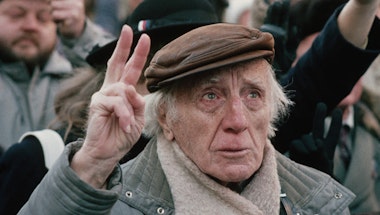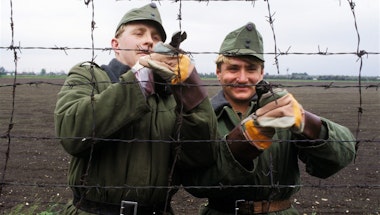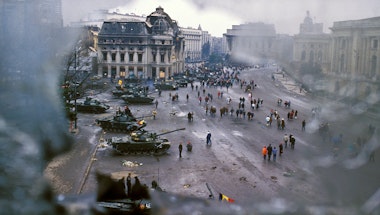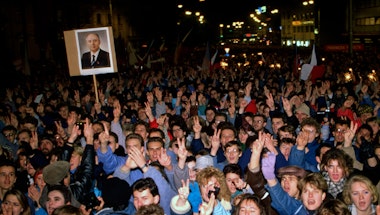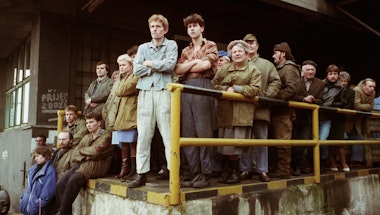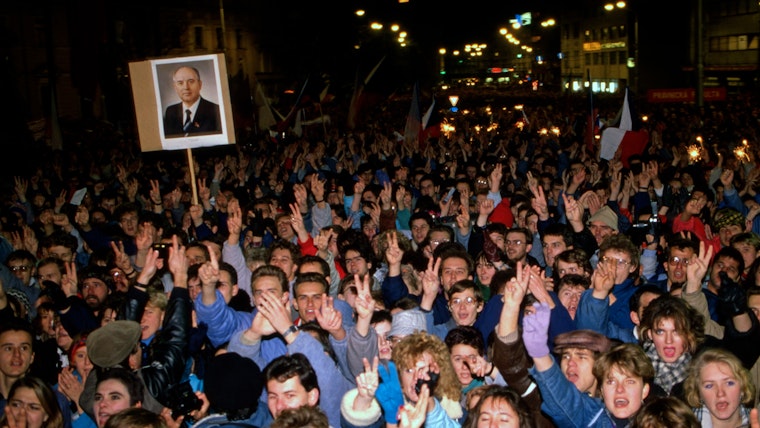
Slovakia
Events in Prague seized the attention of the world in 1989 as Czechoslovakia’s “Velvet Revolution” unfolded. But the first anti-regime student protest took place on November 16 in Bratislava, a city of universities known for its intellectual history. In the 1980s, Slovakia had also seen the rise of a robust dissident environmental movement in response to heavy-handed urban redevelopment in Bratislava as well as concerns about wider destruction of historic buildings and areas of natural beauty.
Jakub Kratochvil
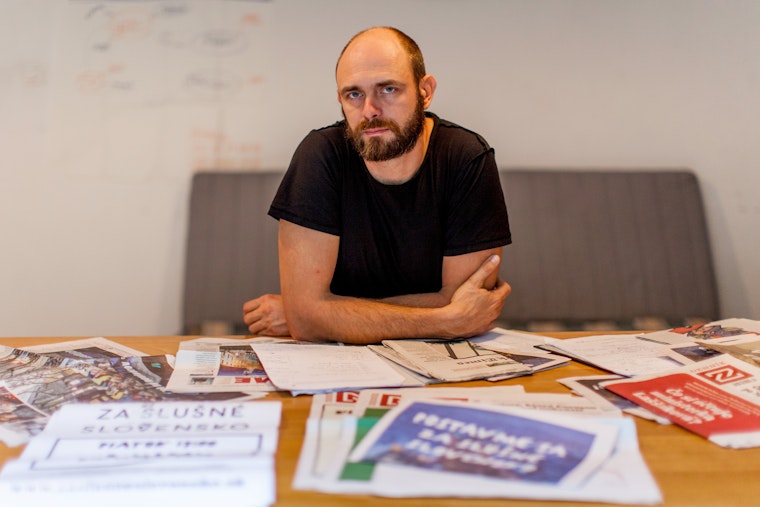
One day last year, Jakub Kratochvil participated with a couple of friends in organizing a protest through Facebook. To their shock, the initial protest exploded into a movement, with tens of thousands of people filling the streets, leading to the eventual resignation of Prime Minister Robert Fico.
But perhaps Kratochvil should not have been so surprised. In November 1989, when he was seven, he was on his way back from school and passed by Bratislava's demonstrations—which helped bring down Communism.
In fact, protest and more have marked every key juncture in modern Slovak history. Seven-year-old Kratochvil’s school route passed the square named for the 1944 Slovak uprising against the Nazis and their collaborators. In 1989, Kratochvil and his schoolfriends picked up on something that the adults were singing. It was Karel Kryl’s "Little Brother, Close the Gate," the iconic protest song written in the wake of the Soviet-led invasion of 1968.
When Kratochvil was a teenager, Slovaks were protesting against the leadership of Vladimír Meciar, the very first of the Central European populists who rode roughshod over the law and oversaw the privatization of state assets, which often looked more like a division of the spoils with his friends and supporters than anything else.
Now Kratochvil is a member of the leadership of the “For a Decent Slovakia” movement, which was sparked in February 2018 by the murder of Jan Kuciak, an investigative journalist, and his fiancée, Martina Kusnirova. Kuciak had been looking into fraud among politically connected businessmen and the links between politicians and the Ndrangheta, a mafia-like organization based in Italy.

In the wake of the murders, Kratochvil, who had been working as a journalist and then as a freelance video producer, offered to help a couple of friends with a protest. More than 25,000 people turned up to the event they promoted on Facebook “We don’t want to go back to the ‘90s!”—a reference to the corruption of the Mečiar years. After the third protest, prime minister Fico resigned, accusing Kratochvil and his friends of being “Soros’s Children." (In truth, they received no help from George Soros or the Open Society Foundations).
“We have democracy, but it is not working. We just want democracy to be fixed.”
To people like Martin Butora, one of the organizers of the Slovak protests of 1989, Kratochvil and his friends are clearly taking up the baton handed to them by previous generations. To Kratochvil, the comparison is not so obvious. In 1989 he says, the protestors wanted the downfall of a whole system. Now he says, “we have democracy, but it is not working. We just want democracy to be fixed. We want an open society; we want a decent society and working institutions."
Ever since 1989, Slovak democracy has been blighted by long periods of cronyism, selective justice, intolerance against Roma, attacks on the media and the country’s Hungarian minority; and, now, by a fear of foreign and Muslim migrants (none of whom are actually coming to Slovakia). It is not surprising then that opinion polls make for grim reading.
In 2018, for example, only 32 percent of respondents believed that life is better for people like them than it was in 1989. And 42 percent believe it is not. Nostalgia for a period of full employment and cheap milk is widespread. But real problems—such as poor quality healthcare and education—are a persistent and major sources of dissatisfaction, too.
And yet things are changing. In March, Marian Kocner, a controversial businessman, was charged with ordering the murder of Kuciak and Kusnirova. In June, Zuzana Caputova, a woman whose political life has been shaped as an environmentalist, was elected president. Civil society is as vigorous as it has ever been, across the political spectrum. In one September weekend alone, Bratislava saw students taking part in the global climate strike protest, followed by a “For a Decent Slovakia” rally, followed by a major anti-abortion demonstration.
Surely, then, Kratochvil’s job as a civil society activist is done and he should follow the path of many others into politics, to fight to change the system from the inside? That is not for him, he says, but he thinks that the main task for those who do is to remember not to compromise their beliefs.
Kratochvil also warns against civil society activists becoming too narrowly focused. “We take care of minorities and immigrants and I think LGBTI issues are important,” he says, but it is also important not to forget the mass of ordinary people who simply know that when they go to hospital “it is not working,” that the elderly lack proper care, or that schools lack good teachers because teachers are poorly paid.
If the concerns of civil society activists seem remote from those of most Slovaks, he cautions, if politicians elected to clean up a corrupt system fail, then a chance will be lost for the next 20 years. “People won’t trust them anymore,” he says, and Slovakia’s biggest problem is already that people have lost trust in its institutions and politicians.
Zuzana Mistrikova

Zuzana Mistrikova exudes energy. She has just been to Sweden to talk to people about a new documentary. And then there are premieres for The Painted Bird, a three-hour Holocaust drama that she has co-produced and which is so brutal that, at the Venice Film Festival, it sent some rushing for the exit. But once she begins talking in her apartment in Bratislava, the capital of Slovakia, you understand that she must have always been both hyperactive and a natural organizer. A key moment in November 1989 saw her help people disperse across what was then Czechoslovakia to factories and distant towns and villages to explain the unrolling revolution to a people with no access to real media or information.
Even when the Berlin Wall came down on November 9, 1989, it was not obvious to the then 22-year-old studying at Bratislava’s Academy of Performing Arts that change was coming. “We did not really believe that something would change,”says Mistrikova when messages began arriving on November 17 from fellow students describing police attacks on protesters in Prague.

Things began to move very fast after that. Actors announced a theater strike. Mistrikova was in the audience which reacted to the announcement with 15 minutes of applause. The next day she saw the rector of the academy and told him that students planned a strike. He had been out of Bratislava and had, incredible though it seems today, no idea what was happening. She had VHS videos to show him from Austrian and Soviet television—which, unlike their Czechoslovak counterparts, were reporting events.
That is when people began dispersing from the academy. People with cars were connected to students and others who left to tell the rest of the country what was going on. For the first time in Mistrikova’s life, just as for everyone else’s,the public and private spheres were coming together. Until then she recalls, the Czechoslovak Communists had created a society that was “pure Orwell.” Everyone knew there were words you could only use at home and different words you could use in public.
In June 1990, the first free elections were held and Mistrikova, still a student, was elected as a member of parliament, propelled into the new politics by her popularity and prominence as a student leader. So began a career, first in politics and then in the fields of culture, organizing radio and television stations, drama, advertising, and film production. She realized, she explains, that she had a knack for bringing people together and solving problems.
For people like Mistrikova, for whom 1989 was a new dawn, the 1990s were hard, dominated by the dissolution of Czechoslovakia in 1993, and the rise of the Slovak politician Vladimír Mečiar, the first of Eastern Europe’s populists. “It was sad,” she says because it meant that Slovakia was founded not thanks to the overwhelming demand of its people but because “small, regional politicians decided to make their own state.” Mečiar has since become the subject of a documentary made by Mistrikova that explains the man and his era in forensic and painful detail.
With the benefit of hindsight, Mistrikova says she would have loved it if change could have come more quickly to Slovakia, but she understood it was not possible. People "have to learn the process,” she says. Democracy is not something “you just establish.” It is a process that comes with every small decision.
She argues that the end of Czechoslovakia came with one plus—it was no longer possible for Slovaks to blame their problems on Czechs. Unfortunately, politicians found other people to blame instead—the country’s Hungarian minority, Roma, and now immigrants.
Thirty years on Mistrikova is philosophical about the changes that she has seen. Yes, you can explain to those who don’t remember that this was a time before the internet, mobile phones, and that there was only one photocopy machine in Bratislava. And yet she says, despite modern technology, what worries her is that today, “everyone is in some bubble, in some community of people with the same opinion.” It is not enough she says to just “feel happy with your life and in your house” and not to care about anything else, because “in the end, if it is like this, we will be very surprised by what will happen outside.”
Martin Butora
“We do not have to be desperate about Slovakia’s future because this movement, this emotion, this energy, this determination, this spontaneously organized civic responsibility for the future phase is here.”
— Martin Butora, Co-founder and Honorary President, Institute for Public AffairsIn 1989, Martin Butora was 45 years old.
